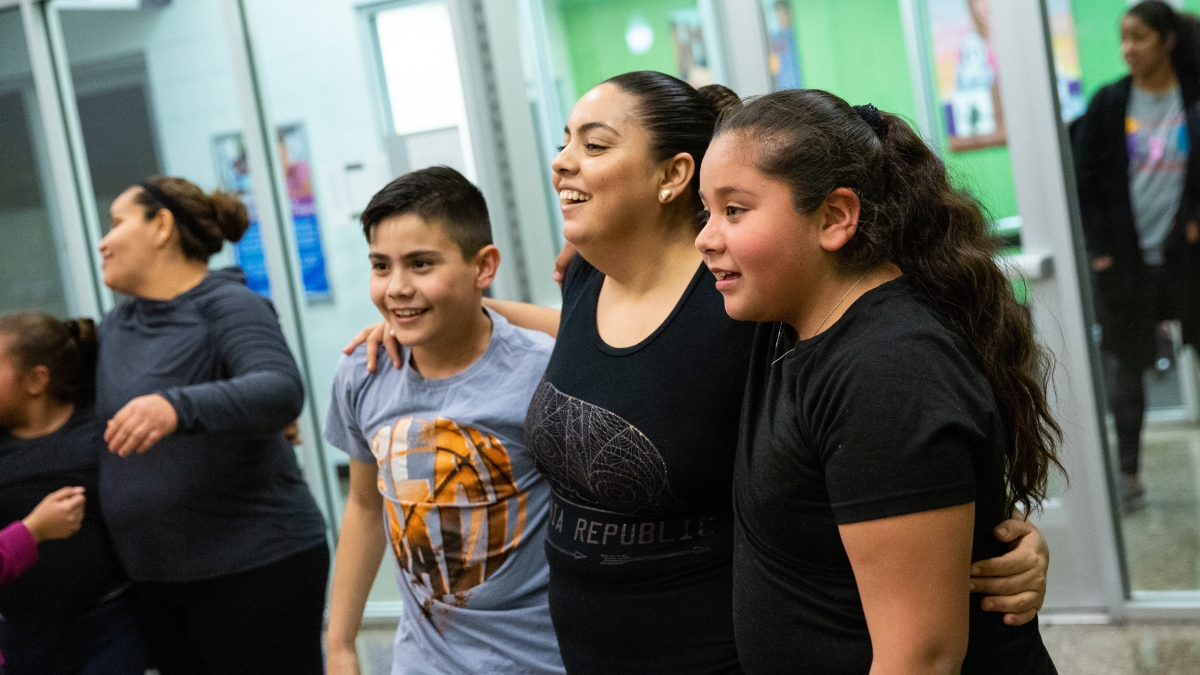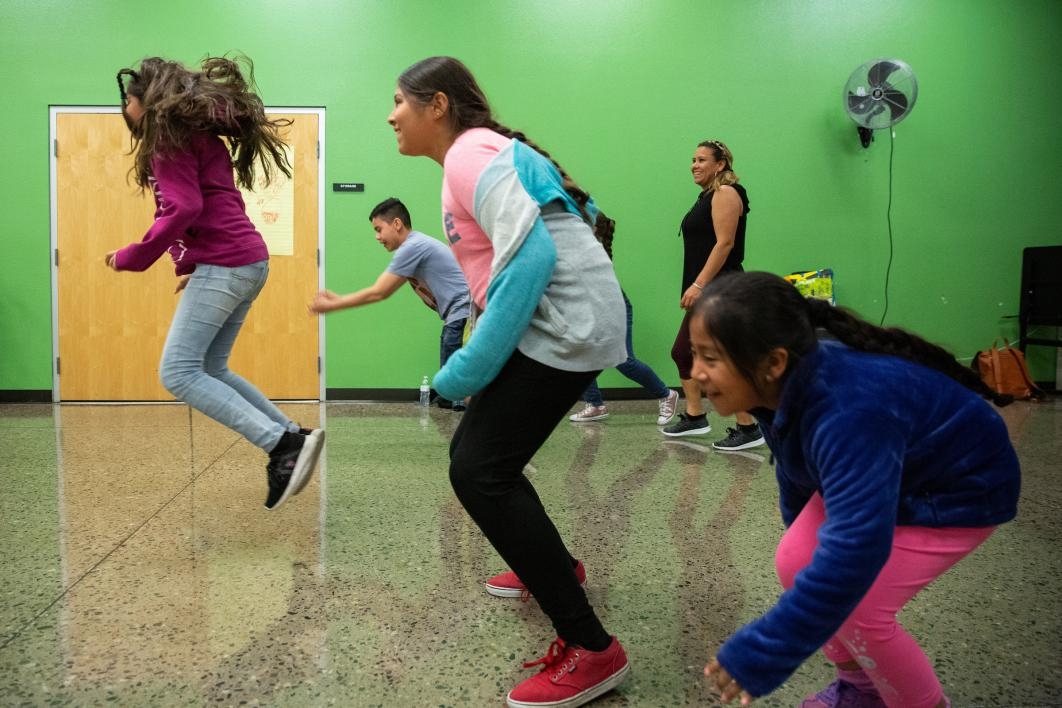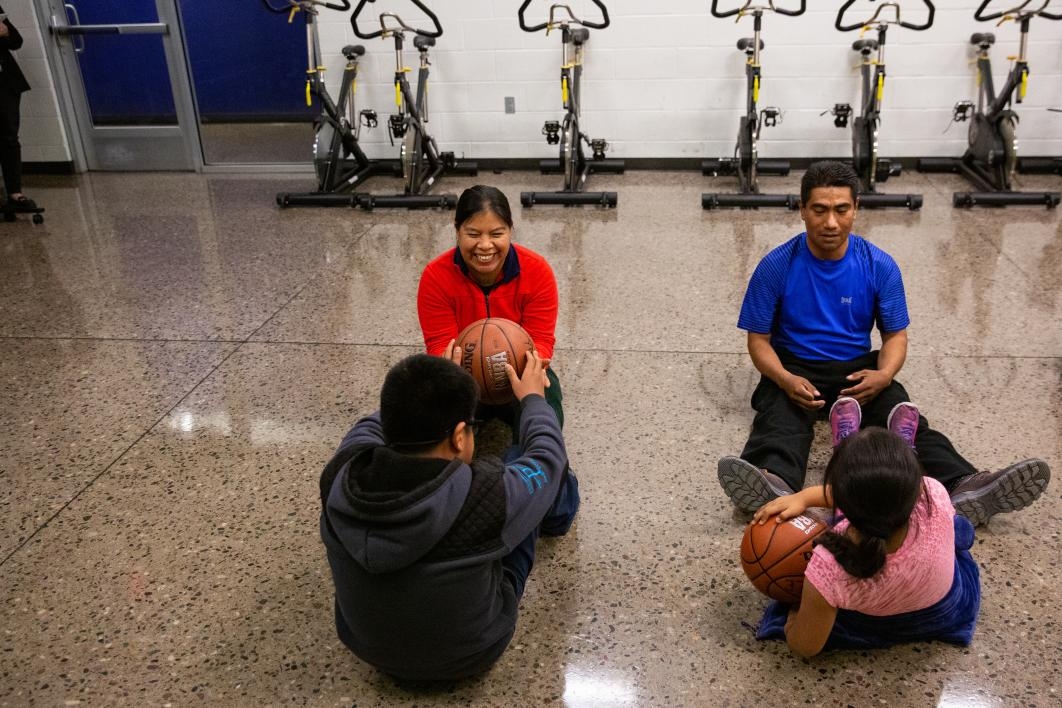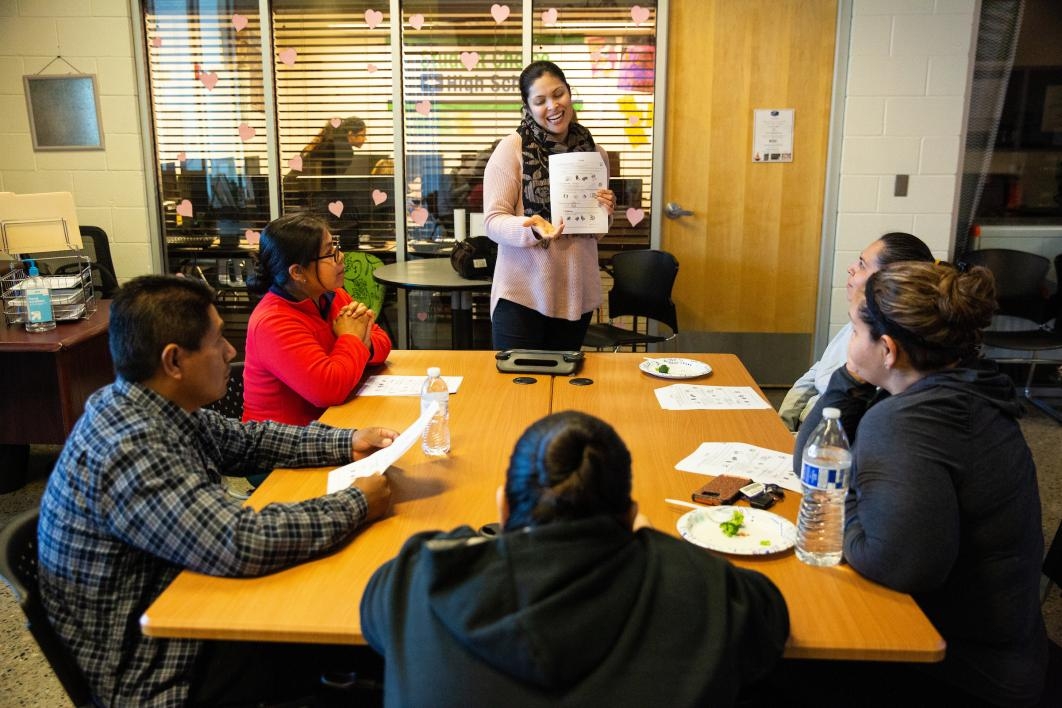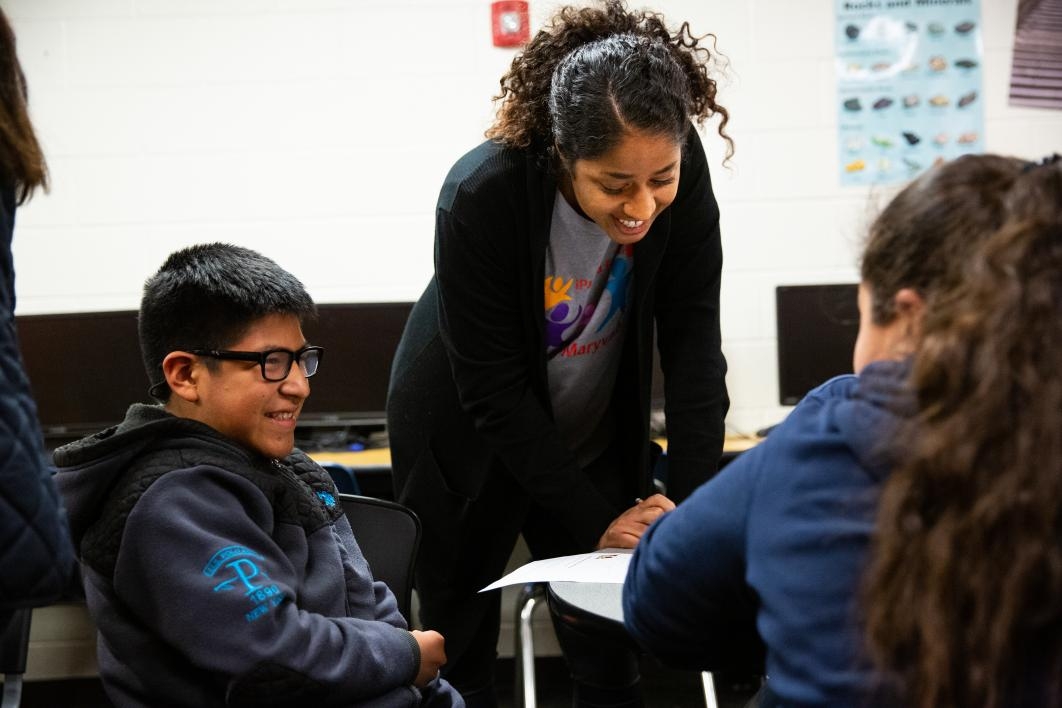Early one spring evening in a bright green workout room at a YMCA in west Phoenix, a petite woman stands at the head of a group of parents and their children demonstrating jump squats.
Her small frame belies the respect she commands as she shouts, “Rapido!” and they promptly comply. Far from a taskmaster, though, Maria Isabel is all smiles and easy laughter, cheering her pupils on and at times literally taking them by the hand and grinding it out alongside them.
She knows how challenging it can seem when you’re starting at the beginning, a novice hiker staring up the daunting mountain climb toward a healthier lifestyle, and it’s not just your health at stake but your children’s. She knows because she was in the same position two years ago when a routine doctor visit revealed that her son Esteban was pre-diabetic and subsequent tests revealed that so was she.
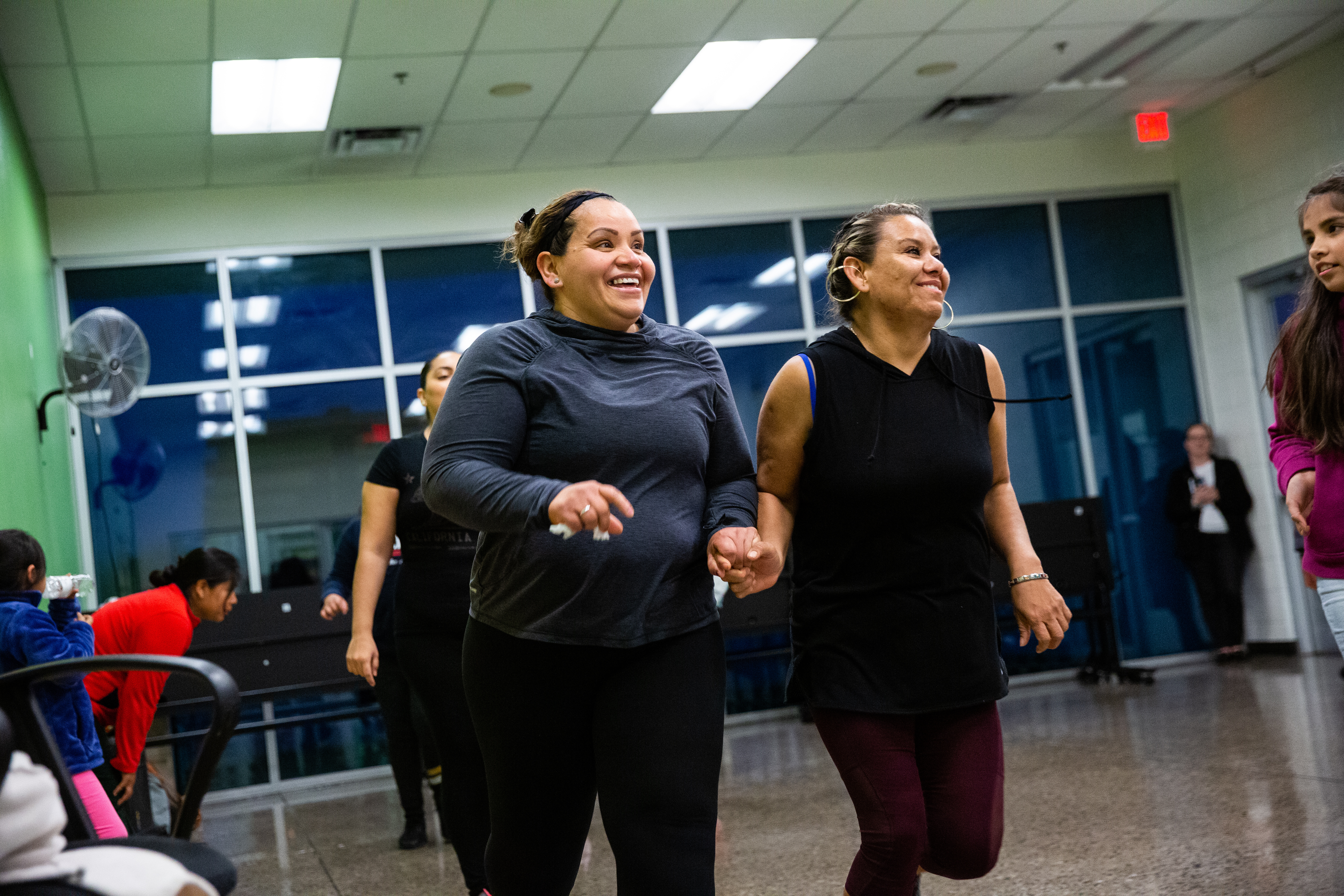
Community leader Maria Isabel (right) and Mirella Torres during the exercise portion of the ¡Viva Maryvale! program at the Watts Family Maryvale YMCA on Feb. 20. Photo by Deanna Dent/ASU Now
Isabel is a longtime resident of Maryvale, a predominately Hispanic community of roughly 215,000 in the West Valley where obesity and Type 2 diabetes are highly prevalent. But thanks to the disease prevention program her doctor referred her to, she and her son are no longer at risk. What’s more, Isabel is now a facilitator of the program, a product of need-inspired collaboration between researchers at Arizona State University and strategic community partnerships.
As a researcher at ASU’s Edson College of Nursing and Health Innovation, Associate Professor Gabriel Shaibi examines obesity-related health in high-risk and vulnerable populations with the goal of developing and implementing sustainable, community-based models of disease prevention. So when he discovered a team at St. Vincent De Paul was already hard at work on just such a program, he saw an opportunity to join forces — ASU would bring the research prowess to ensure the program worked, and St. Vincent De Paul would bring the connection to the community that would ensure the program lasted.
They dubbed the project ¡Viva Maryvale!
“It made sense to bring the research to the community where it can have the biggest impact,” Shaibi said.
He and his team at ASU’s Center for Health Promotion and Disease Prevention published their initial findings from the two-year-long project earlier this year in the American Journal of Preventative Medicine. The results were significant from a clinical standpoint, showing lowered risk for diabetes and increased physical activity among the participants.
And there were other positive outcomes — namely, both program participants and community partners, which expanded to include the Watts Family Maryvale YMCA and the Mountain Park Health Center, have continued on with the program, embracing it fully and volunteering their time to facilitate it, even though the project funding has ended.
According to Shaibi, the sustainability of the program relies heavily on two things: cooperation between community partners and people like Isabel who can not only personally vouch for it but who are already embedded in the community and have their trust. To that end, it is an essential function of the program to identify and train participants to be facilitators.
“After going through the program myself, I have a better idea of what I need to do and how to do it, and that's one of the things that I transmit to the families,” Isabel said.
As the first participant-turned-facilitator, she has certainly made an impression.
“She is a natural leader and an inspiration to us all,” Shaibi said. “In terms of her progress, she is actually way ahead of us when it comes to ideas for growing the program and increasing its impact. She truly represents the future of our work, and we look forward to learning from her.”
Maria Silva, manager of St. Vincent De Paul’s Family Wellness Program, helmed the organization’s community-based disease prevention program before it became a part of the Viva Maryvale project and continues to lead nutrition education classes for it now. She emphasized the difference it makes when a program is delivered from within the community rather than without.
“Maria Isabel creates a really great rapport with the families,” Silva said. “She understands how they feel, so she’s able to bring a different perspective than what we have and really connect with them on a different level.”
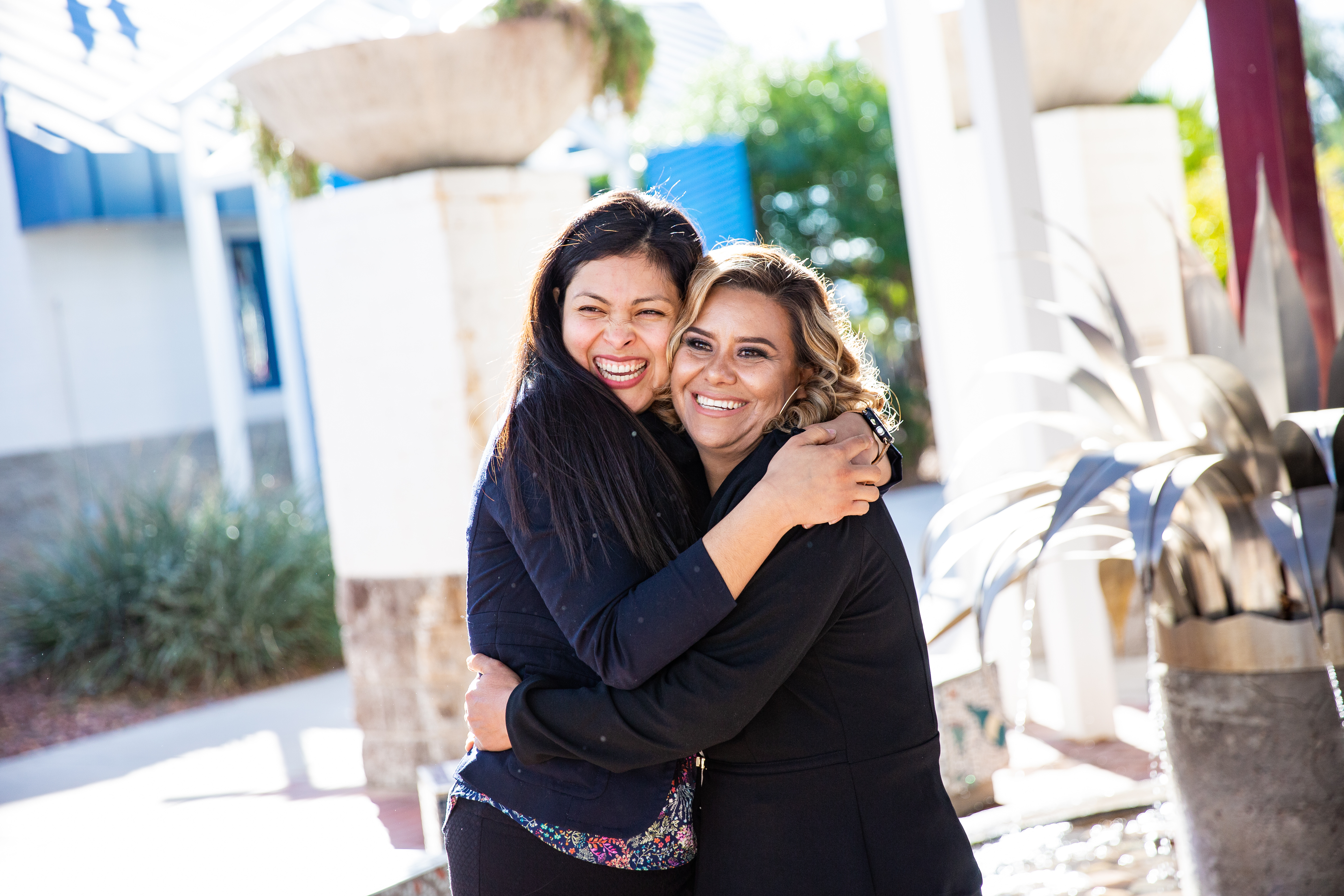
Maria Silva (left), manager of St. Vincent De Paul’s Family Wellness Program, and ¡Viva Maryvale! facilitator Maria Isabel have become good friends after working together and now help provide support for new families in the program. Photo by Deanna Dent/ASU Now
Isabel even initiated a successful group chat using the WhatsApp messaging platform so that each cohort could communicate easily and check in on each other’s progress over the course of the 12-week program. Silva was able to observe the participants’ eager engagement as they shared photos of themselves at the gym and recipes for post-workout smoothies.
The most recent cohort celebrated their completion of the program with a potluck party in early April, where they brought dishes inspired by what they learned in the nutrition classes. That curriculum, along with lessons on health and self-esteem, were provided by St. Vincent De Paul. The space where they learned and sweated for 12 weeks was provided by the YMCA. Referrals from the Mountain Park Health Center were the reason they were all there in the first place. And ASU research provided the data that proved it all works.
“This project demonstrates the potential for collaborative research to set the stage for sustainable health promotion programming, particularly when it is grounded in the local community,” Shaibi said. “We hope our work can be leveraged to inform evidenced-based policies and reimbursement mechanisms that will support wide-scale diabetes prevention programs across the state.”
Top photo: Gladis Frias hugs her kids, Jesus and Maria Jose, during the exercise portion of the ¡Viva Maryvale! program at the Watts Family Maryvale YMCA. Photo by Deanna Dent/ASU Now
More Health and medicine

Innovative, fast-moving ventures emerge from Mayo Clinic and ASU summer residency program
By Georgann YaraIn a batting cage transformed into a custom pitching lab, tricked out with the latest in sports technology, Charles Leddon and his Mayo Clinic research teammates scrutinize the…
Is ‘U-shaped happiness’ universal?
A theory that’s been around for more than a decade describes a person’s subjective well-being — or “happiness” — as having a U-shape throughout the course of one’s life. If plotted on a graph, the…
College of Health Solutions medical nutrition student aims to give back to her Navajo community
As Miss Navajo Nation, Amy N. Begaye worked to improve lives in her community by raising awareness about STEM education and health and wellness.After her one-year term ended last month, Begaye’s…
